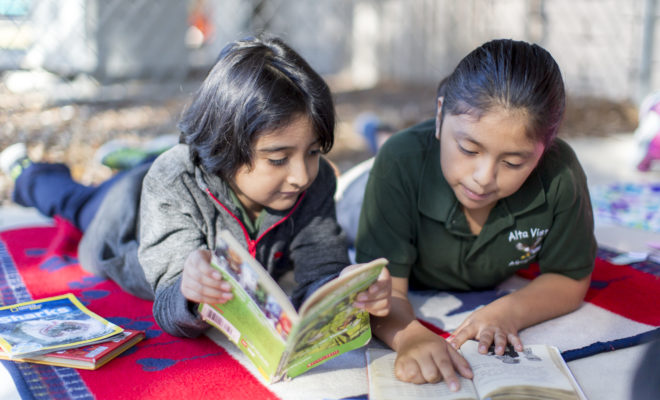
Feature
Creating Success Through the Summer Learning Academies
By Ryan G. Van Cleave
The intricacies of our education system can be frustrating for those of us uninitiated with the workings of local, state, and federal governments. Rather than walk away, bemoaning “the system,” several area philanthropists have focused their charitable giving on how to improve local schools so they can help develop new ways of operating that benefits students in need.
Based on research they’d found, Joe and Mary Kay Henson—Connecticut residents who winter in Sarasota—wanted to take on the achievement gap between low-income elementary students and their more affluent peers. Studies show that 4 things can help close that gap.
• Summer learning
• Pre-k readiness
• Attendance
• Health and wellbeing of a child
The Hensons decided to combat “summer slide”— the regression that takes place in the summer months, which is far more pronounced in low-income families. So, in 2012, with help and guidance from Alta Vista Principal, Dr. Barbara Shirley, the Hensons launched the Eagle Academy at Alta Vista Elementary, a school with a large population of low-income students. The Eagle Academy provided rising Kindergarten students with six weeks of summer instruction as well as two meals a day and opportunities for enrichment activities that brought a sense of fun to the learning.
The next year, all Alta Vista students entering Kindergarten and first grade were offered the chance to participate in that same summer program. Each year an additional grade was added up through rising third graders. Third grade is particularly important because that’s when statewide standardized testing really comes into play for the first time in a student’s academic life. Back when the Summer Learning Academy was launched, the statewide standardized test was the FCAT, and now it’s morphed into the FSA; regardless of the name, those are big tests with high stakes.
The success of the free Summer Learning Academy was quickly apparent both anecdotally and from data accumulated through benchmark testing and the I-Ready diagnostic tool that measures reading and math proficiency.
With the support of the Community Foundation of Sarasota County and additional generous donors, Summer Learning Academies expanded to three additional schools with high numbers of low-income students to attempt to replicate the increases in student achievement. The programs developed at Emma E. Booker, Tuttle, and Gocio elementary schools, and similar results were achieved.
In fact, the data allowed Sarasota County Schools Superintendent Dr. Todd Bowden to appeal to legislators in Tallahassee in 2017 for funding to support the expansion of the Summer Learning Academies. While there, Dr. Bowden heard again and again from other superintendents who said, “We’d like money to pilot a program.” He in turn was able to say that the Sarasota School District didn’t need to pilot anything. They’ve already done that, and it was a success. What they needed now was simply to expand it.
According to Sarasota County Schools, children who attended at least half of the program increased their reading scores by an average of 7.6 points. Those who didn’t attend? They averaged only a .3 increase.
With this data, the Florida Department of Education responded.
Heading into the summer of 2019, all 12 Title 1 elementary schools in Sarasota County will take part in the Summer Learning Academies program. Attendance is expected to eclipse the nearly 1,100 students who took part in summer 2018. While philanthropic dollars and support from the Community Foundation of Sarasota County got this program started, the budget for this successful school district program will increase from $1.1 million in 2018 to $1.8 this year and $2.4 in 2020.
Kirsten Russell, the Community Foundation’s Director of Community Investment, points out that it’s not just kids who are winning here. Thanks to a two-generation approach, parents are also getting help over the summer. In addition to the six cost-free weeks of school instruction and daylong enrichment activities, parents have weekly classes of their own they take, which shows their kids that learning is important to everyone.
“The Community Foundation has an investment in the parent university component,” reports Russell. “We’re looking at what we can do for parents. We want to make use of that time to bring parents into the picture. We want parents to start talking about their dreams. We want them to feel part of the story, too.” She points out that while low-income families have access to financial support to pursue educational opportunities, some don’t know about the available resources. With donors, the Community Foundation is looking at innovative ways to build collaborative efforts around the possibilities for parents to change their level of education, thereby altering their own workforce trajectory.
One example of this is Alta Vista’s adult CNA program, the Certified Nursing Assistant Program, which has been around since 2013. It’s been changing the lives of many parents whose previous jobs often were minimum wage positions. President and CEO of the Community Foundation Roxie Jerde believes that this initiative truly demonstrates that if you provide motivated people in our community the opportunity to better their lives, they’ll seize it and incredible things can happen.
Jerde also believes that philanthropic dollars can be a source of risk capital that can lead to positive change in areas of need. Philanthropists like the Hensons think we can do better, and they’re willing to take on riskier propositions in an effort to try to improve lives. With the help of the Community Foundation and others in our community, the future of education in our part of Florida seems primed to benefit those most in need.
For more information on the Community Foundation of Sarasota County, please visit www.cfsarasota.org or call 941.955.3000.



You must be logged in to post a comment Login